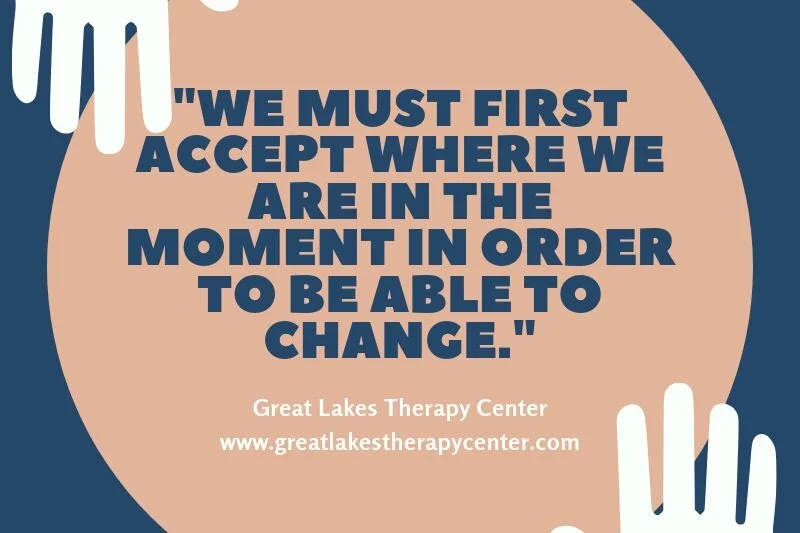Balancing Acceptance and Change (Copy)
We are very excited to announce that our DBT practice is moving to a new office! Great Lakes Therapy Center will now be located at 123 W Madison Suite 2150! We will still be in the Chicago Loop. We will still be offering comprehensive DBT. We will still be talking about our dogs in group as homework examples. Many things will stay the same and there is still a great amount of change that occurs when moving from one space to another. Moving, while it can be frustrating, is an excellent opportunity to balance acceptance and change together!
The “D” in DBT is for dialectics- meaning two things that appear opposite or contradictory can both be true at the same time. The dialectical balance can be applied to the relationship between acceptance and change. Individuals are often seeking therapy because they are motivated for some kind of change to occur. DBT is different from other behavioral therapies by taking the stance that we must first accept where we are in the moment in order to be able to change.
When learning about radical acceptance, clients will sometimes say that it feels like approval. It is not saying you approve of something or like it. Acceptance is taking the stance “This is how this moment is.” Sometimes, clients will say it feels like an opposition to change. It is not saying that we do not want change to occur. Acceptance creates clarity to know what change can actually occur. Other times clients will say that it feels like minimizing painful experiences. Acceptance of reality means accepting the pain of a situation without invalidating its significance.
Acceptance is choosing to stop fighting reality as it is so moving forward towards change is actually possible, which reduces our own suffering.
For example, we are moving into a new space. Moving of any kind requires coordinating many little details so the moving process occurs successfully. In this situation, fighting reality as it is could look like avoiding all the work that needs to be done when I feel overwhelmed. The reality I could be refusing to accept is the amount of work that goes into moving. By fighting or avoiding it, the work does not go away. The same amount of work is present and I will likely feel more miserable due to procrastination contributing to stress long term. Accepting the amount of work that needs to be done increases my willingness to observe and participate in the change that needs to occur. The change in this situation is my judgement that moving is “too much” and shifting to a nonjudgemental description of “this is what needs to be done.” Radical acceptance provides an opportunity for my perspective to shift from what I think should be fair to what is effective in the situation.
This is only one example of acceptance and change. To learn more about how to balance acceptance and change in your own life, contact us. We look forward to seeing our clients at Great Lakes Therapy Center’s new location at 123 W Madison Suite 2150, Chicago, IL.
To learn more about why acceptance and change is important in DBT, learn more from Marsha Linehan’s Behavioral Tech FAQ or from Marsha Linehan discussing how she learned radical acceptance.


